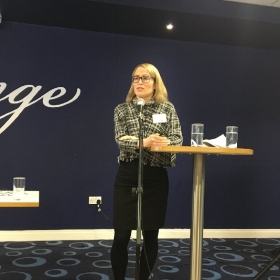[et_pb_section bb_built=”1″ _builder_version=”3.0.47″ custom_padding=”0|0px|0|0px|true|false”][et_pb_row custom_padding=”0|10%|0|10%|true|true” custom_padding_tablet=”|1%||1%||true” custom_padding_phone=”|1%||1%||true” custom_padding_last_edited=”on|desktop” _builder_version=”3.15″ background_size=”initial” background_position=”top_left” background_repeat=”repeat”][et_pb_column type=”4_4″][et_pb_post_title author=”off” categories=”off” comments=”off” featured_image=”off” _builder_version=”3.15″ title_font=”||||||||” title_text_color=”#c11a1e” title_line_height=”1.3em” meta_font=”|||on|||||” meta_text_color=”#bcbcbc” meta_font_size=”17px” text_orientation=”center” /][et_pb_text _builder_version=”3.17.6″]

Did you know that Women’s football, at its peak, was banned for almost 50 years in England? Our co-founding member, Carol Couse recently presented at the one day conference ‘Discrimination Against Women in Sport’ which was held on Wednesday 8th March 2017, as part of the International Women’s Day celebrations. The event provided a forum to explore how historical views and decisions regarding women and sport prevented the development of women in sport and how, on reflection, the lessons learnt can be used to improve participation now and in the future. The event, hosted a range of speakers highlighting the important role of women in the development of a variety of sports, including football, boxing and cricket.
The event provided a forum to explore how historical views and decisions regarding women and sport prevented the development of women in sport and how, on reflection, the lessons learnt can be used to improve participation now and in the future. The event, hosted a range of speakers highlighting the important role of women in the development of a variety of sports, including football, boxing and cricket. Carol spoke on the professionalisation of women’s football. An important point to note is that women’s game is not a new phenomenon in the UK. In fact women were encouraged to take up football in World War One, an era in which they stepped into the shoes of the absent men, in both a professional and sporting arena.
Significantly in the last few days, The Football Association admits it has been “too slow to react” to changing attitudes towards women’s football and has launched an initiative to double participation in the women’s and girls’ game to nearly six million by 2020, as part of a strategy called ‘The Gameplan for Growth’. Senior FA officials claim, historically, the organisation “clearly let down women”. We will update you on further developments in due course.
[/et_pb_text][/et_pb_column][/et_pb_row][/et_pb_section]


